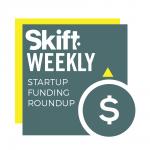Skift Take
This week, travel startups announced more than $168 million in funding. Investors bet on concepts that included a flying hydrofoil, long-haul ground transport, a Chinese version of TripActions, Muslim travel, carbon-free air travel, contactless tech for hotels, and more.

Travel Startup Funding This Week
Each week we round up travel startups that have recently received or announced funding. Please email Travel Tech Reporter Justin Dawes at [email protected] if you have funding news.
This week, travel startups announced more than $168 million in funding.
>>BlaBlaCar, which offers both long-distance carpooling and intercity bus travel, said this week it had raised $115 million (€97 million) in fresh investment. See Skift’s story.
>>Universal Hydrogen, a company striving to fuel carbon-free air travel, has closed a $20.5 million Series A financing round.
Playground Global led the round. Other investors include JetBlue Technology Ventures, Coatue, Airbus Ventures, and Global Founders Capital.
The startup said it “stitches together the end-to-end hydrogen value chain for aviation, both for hydrogen fuel and hydrogen-powered airplanes.”
>>Z-Trip, a business travel company based in Shanghai, has completed a fresh round of financing of more than more than $15 million, or “more than 100 million renminbi.”
Dongfang Jiafu led the round.
Z-Trip, founded in 2015, is somewhat similar to TripActions and TravelPerk in that it offers one-stop online travel booking services for companies. But it caters to the unique needs of the Chinese market, with integrations with meeting planner agencies, car hire services, payment and reimbursement services, and so on.
Z-Trip CEO Congwei Huang said in a statement that his company provides travel management services for more than 1,000 medium and large groups and publicly listed companies, such as Fosun Group and China Wanda Group. The company’s “order volume” doubled in the past year, despite the pandemic, it said.
>>Regent Craft, a maker of flying electric ferry boats, has raised $9 million in funding.
The Boston-based startup is working on a seaglider that sails like a hydrofoil and flies like an aircraft, reported CNBC.
>>HalalBooking, which helps Muslim travelers book halal-friendly travel, received a $5 million investment in March 2021 from private angel investors, including British Business Bank, in the form of convertible debt. The startup is continuing to raise funds.
HalalBooking helps travelers find hotels and restaurants that don’t push alcohol. Many of its resorts offer dedicated men-only and women-only facilities for indoor and outdoor swimming pools and spas.
>>Virdee, a contactless tech vendor for accommodation providers, has closed a round of $4 million in seed financing.
Silverton Partners led the round. LiveOak Venture Partners and DJR Advisors also took part. DJR Advisors is a group that includes Richard Gray, who founded, built, and ultimately sold hotel analytics company TravelClick to Amadeus.
Virdee offers check-in and virtual concierge services to hotels and commercial real estate companies.
“We believe the debate about whether automated check-in, verification, and payment solutions will replace legacy methods is now long settled, and the question is now not ‘if’ but ‘when,'” said Virdee co-founder Nadav Cornberg.
See Skift’s profile of Virdee, back when its CEO was Rajiv Trivedi, past CEO of La Quinta.
>>Ocus, a tech solution for handling imagery, has closed a $24 million investment led by Ring Capital.
The Paris-based company isn’t a travel startup, but many travel brands, including Booking.com, Hilton, KKDay, and Radisson, use its services. Ocus helps these travel brands and other companies digitally source the most relevant images for online marketing. It also tracks which images drive the most social engagement and booking conversions.
Skift Cheat Sheet:
We define a startup as a company formed to test and build a repeatable and scalable business model. Few companies meet that definition. The rare ones that do often attract venture capital. Their funding rounds come in waves.
Seed capital is money used to start a business, often led by angel investors and friends or family.
Series A financing is typically drawn from venture capitalists. The round aims to help a startup’s founders make sure that their product is something that customers truly want to buy.
Series B financing is mainly about venture capitalist firms helping a company grow faster. These fundraising rounds can assist in recruiting skilled workers and developing cost-effective marketing.
Series C financing is ordinarily about helping a company expand, such as through acquisitions. In addition to VCs, hedge funds, investment banks, and private equity firms often participate.
Series D, E and beyond These mainly mature businesses and the funding round may help a company prepare to go public or be acquired. A variety of types of private investors might participate.
The Daily Newsletter
Our daily coverage of the global travel industry. Written by editors and analysts from across Skift’s brands.
Have a confidential tip for Skift? Get in touch
Tags: funding, startups, vcroundup
Photo credit: A photo-illustration of what the Regent's first electric flying machine that will transport commercial passengers by water and air might look like when finished. Regent
